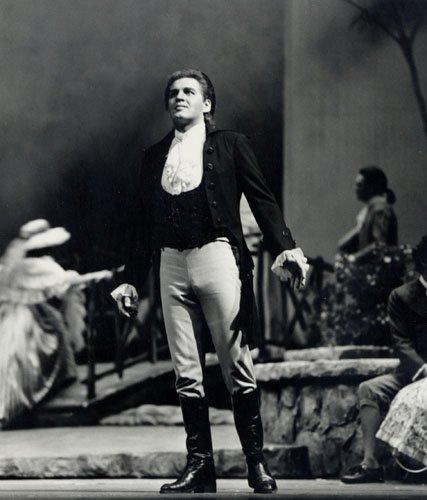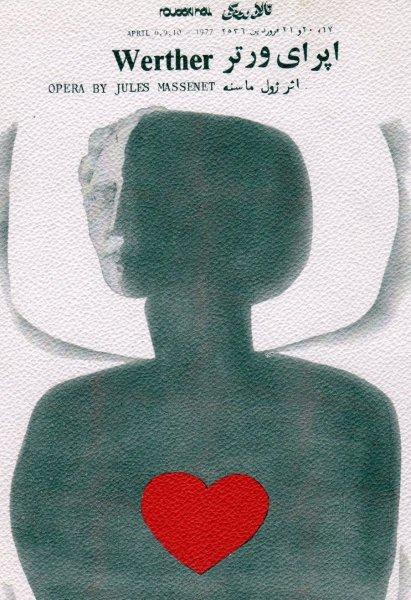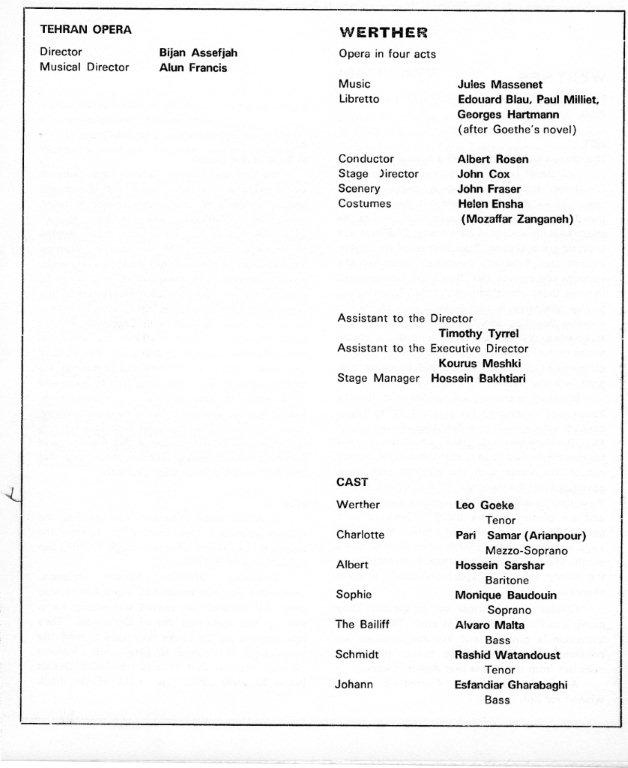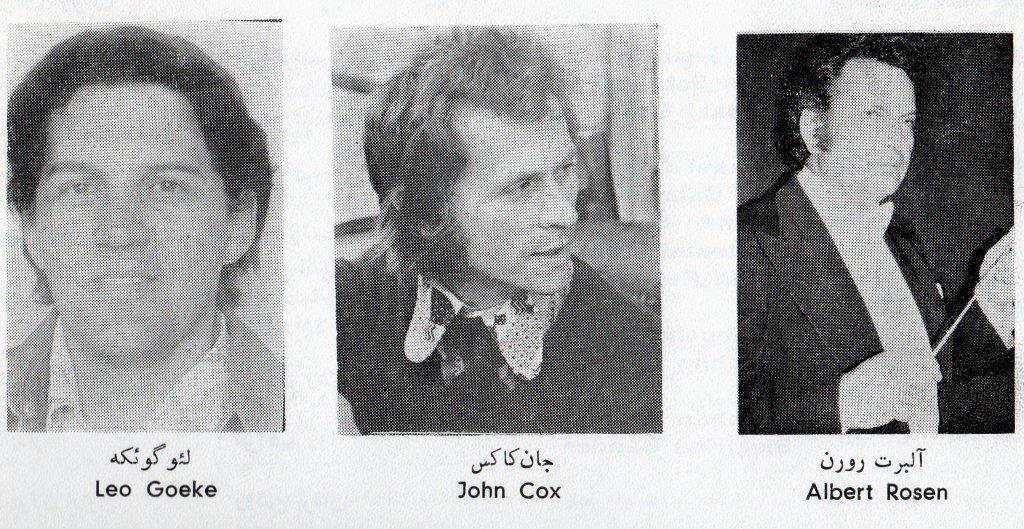Liliana Osses Adams
Notes on the Roudaki Hall in Tehran, Iran
Leo Goeke as Werther at Roudaki Hall
With great sadness I learned of the passing of Leo Goeke – an American operatic and concert lyric tenor, on September 18, 2012, at the age of 75, after suffering two strokes. I have fond memories of his guest appearance in the leading role of Massenet’s “Werther” at Roudaki Hall Tehran Opera House. Following his successful Werther at the Seattle Opera in 1976, he joined the cast at Tehran Roudaki Opera Theater in 1977.

Leo Goeke as Werther at Seattle Opera, 1976
(Photo by Des Gates, courtesy Seattle Opera House Archives)
Although he caught a cold, he managed to sing at the premiere on April 6, and at two subsequent performances on April 9, and 10, 1977. His lyric, supple voice, supported by technical abilities was well-projected. His musical phrasing and intonation were carried out clearly and impeccably. He was widely recognized for his musicianship and his portrayal of Werther – a young handsome looking man, fascinating and passionate poet-dreamer often gained him recognition and much deserved success. He was deeply touching in “Ȏ Nature, pleine de grâce”, the invocation to the nature at the idyllic scene in the first act. His highly emotional passages of Ossian Song in third act, that he was translated: “Pourqoui me réveiller, ô souffle du printemps?” evoked his suicidal thoughts and foresees his inevitable tragic end.
Werther’s hopeless love, Charlotte, was sung by Pari Samar, an attractive and remarkable Iranian mezzo-soprano, especially warmly applauded in the moving letter scene at the beginning of third act: “Ces lettres!... ces letteres!... je les relis sans cesse!”.

Werther” by Jules Massenet, Tehran Opera House Roudaki Hall, 1977
(Courtesy Liliana Osses Adams, private collection.)
Jules Massenet (1842-1912) composed more than 30 operas; many of them are forgotten. Today, he is best known for two operas: “Manon” and “Werther” – the masterpieces of the French style opera, and for the famous “Méditation” – a symphonic intermezzo for violin solo and harp from “Thaïs”, rather rarely performed spiritual drama in three acts.
Written in the late 19th century, Massenet’s “Werther” in four acts, is based on the epistolary novel by Johann Wolfgang von Goethe “The Sorrows of Young Werther” (Die Leiden des jungen Werthers). In 1774, Goethe introduced the tormented young poet in a series of letters written to his friend Wilhelm, where he gave a very intimate account of his own personal experiences. The story of forbidden love attracted cult-like followers across Europe – seemingly in distress as their romantic hero – and resulted in a wave of suicides among young man.
Tehran Opera House presented Massenet’s “Werther” in the following line-up: Werther by Leo Goeke; Charlotte by Pari Samar (Arianpour); Albert by Hossein Sarshar; Sophie by Monique Baudouin; The Bailiff by Alvaro Malta; Schmidt by Rashid Watandoust, and Johann by Esfandiar Gharabaghi; Albert Rosen was at the pit; John Cox was the stage director; scenery was made by John Fraser, and the costumes by Helen Ensha (Mozaffar Zanganeh).

Photos from Tehran Opera Program, “Werther” by Jules Massenet, 1977
(Courtesy Liliana Osses Adams, private collection)
WHERE ARE THEY NOW?

(Photos from Tehran Opera Program, "Werther" by Jules Massenet, 1977, courtesy Liliana Osses Adams, private collection)
Albert Rosen
Guest Conductor for Massenet’s “Werther”, Tehran Opera House; April, 1977
Albert Rosen, conductor of opera and symphony, was born in Vienna, on February 14, 1924, of Czech and Austrian parentage. He began music education at the Prague Conservatory under Alois Klima on piano, violin and horn. He continued his study at Vienna Music Academy under Julius Ebenstein on violin, following graduate studies of composition under Josef Marx and conducting under Hans Swarowsky.
During 1949-1959, at the beginning of his career, he received operatic training as correpetiteur, assistant conductor and chorus master at the Czech Opera House in Pilsen – today’s J.K.Tyl City Theater (Josef Kajetán Tyl Plzeň Divadlo). In 1964, he was appointed Principal Conductor of the Smetana Theatre in Prague – today’s The Prague State Opera (Národnĭ Divadlo). He held this position until 1971. At that time he conducted symphony and operas at major theaters in Europe. His repertoire included works by Beethoven, Berlioz, Donizetti, Leoncavallo, Mascagni, Massenet, Mozart, Puccini, Rossini, R. Strauss, Stravinsky, Tchaikovsky, Verdi, Wagner, and such rarities as Peter Cornelius’s “Barbier von Bagdad”; Ján Cikker’s “Resurrection” or “Wzkriesenie” (after Tolstoy’s novel); Prokofiev’s “Gambler”(performed at Wexford Festival); Carl Maria von Weber’s “Abu Hassan” (based on a tale from One Thousand and One Nights), and Jarmil Burghauser’s “Bridge”, premiered at The National Theatre in Prague, 1967.
In 1965, he was invited at the Wexford Festival Opera in Ireland. Thus began his long association with the Festival (1965-1994), where he conducted eighteen Wexford productions; more than anyone else.
In 1968, he became the Resident Conductor of the National Radio Television Symphony Orchestra (RTÉSO) in Dublin, Ireland, and one year later, he was appointed the Chief Conductor. In the following years he became an Irish citizen by naturalization. He remained RTÉSO Conductor Laureate at the time of his death.
In 1993, he was appointed Music Director of The Irish National Opera. He appeared as guest conductor in opera houses and concert halls throughout Europe, Middle East, Australia, New Zealand, Canada, and North America.
Apart from performing the standard symphony and opera repertory, he was regarded as one of the finest conductors anywhere, and a great interpreter of Czech composers; including, among others, some unfamiliar opera works by Bohuslav Martinů’s “Griechische Passion” (“The Greek Passion” based on the novel by Nikos Kazantzakis’s “Zorba the Greek”); Leoš Janáček’s “Katya Kabanova” and “Jenůfa”; Bedřich Smetana’s “Devil’s Wall”, “The Kiss”, “Secret”, “Two Widows”, Bartered Bride”, and Antonin Dvořák’s “Devil and Kate”, “Schelm und die Bauern”, and “Rusalka”, marking his operatic début at Plzeň State Opera (1949), followed by symphonic début with Plzeň Philharmonic (1951).
In 1980, he made his American début at San Francisco War Memorial Opera House in Janáček’s “Jenůfa”, recorded live on October 1, 1980, under label: Gala.
Albert Rosen passed away in Dublin, on May 22, 1997, at the age of 73, of lung cancer. His remains have been buried in Prague cemetery, in the Czech Republic (according to the letter I have received from Martyn Westerman, then the Executive Director of the RTÉSO (1999-2003).
John Cox
Stage Director for Massenet’s “Werther”, Tehran Opera House; April, 1977
John Cox, stage producer for opera, theater and television was born on March 12, 1935, at Bristol, England. He studied at Oxford University under Nevill Coghill, theatrical producer and director of the Oxford University Dramatic Society, and under Jack Westrup, musicologist, composer and lecturer at Oxford. In 1957, he made the operatic début in Verdi’s “Ernani” at Oxford University Opera Club, conducted by Jack Westrup. He began his early artistic training at Berlin Komische Oper under Walter Felseinstein (in the former East Germany). From 1959- 1963, he became associated with Glyndebourne Festival Opera and served as its assistant stage director.
In 1972, after a short period of further apprenticeship in dramatic theatre, he was appointed Director of Productions and Resident Stage Director at Glyndebourne Festival, succeeding Carl Ebert and Günther Rennert. The Glynbourne Festival was founded in 1934 by John Christie, the owner of the estate of Glynbourne, surrounded by beautiful gardens, and by his wife, the soprano Audrey Mildmay. At the first Glyndebourne season two Mozart’s opera were presented: “Le nozze di Figaro” and “Così fan tutte”, conducted by Fritz Busch and under artistic direction of Carl Ebert; in following years, the Festival became one of the favorite gatherings among the fashionable society (perhaps attracted by the gallantry of London Vauxhall Gardens).
In 1975, John Cox’s legendary production of Stravinsky’s “The Rake’s Progress” with sets and costumes designed by David Hockney was based on the original eight 1735 engravings of William Hogarth: The Heir-The Levée-The Orgy-The Arrest-The Marriage-The Gaming House-The Prison-The Mad House. Stravinsky’s opera in three acts, in neo-classical style, depicts the story of Tom Rakewell, a young man who ruined his fortune inherited from a dead relative and from the marriage with old, bearded women. John Cox/David Hockney Glyndebourne’s staging has proven to be one of the Festival’s most durable successes and has been revived in 1977, 1978, 1980, and most recently in August 2010, recorded on DVD. Thus began more than thirty five year’s collaboration between the two artists and their work was transferred all over the world – to La Scala, the Metropolitan Opera, New York City Opera, Royal Opera House, Sydney Opera, and at the opera houses in Paris, Chicago, Dallas, San Diego, and Los Angeles.
The 1975 production of Stravinsky’s opera at Glyndebourne Festival, the title character of Tom Rakewell was sung by Leo Goeke. He dazzled the audience with his portrayal of the Rake who, after a life of luxury and excess, falls into madness and ultimately dies in mental asylum.
In 1981, John Cox resigned from Glyndebourne Festival. During his long career he has been associated with virtually every important opera company and festival in the world from Austria, Germany, France, United Kingdom, Australia, to North America, staging the operas by Mozart, Puccini, Ravel, Rossini, R. Strauss, Wagner, and Cavalli’s “Egisto”; Cherubini’s “Medea”; von Einem’s “Besuch der alten Dame”, and Massenet’s “Werther” and “Thaïs”.
His recent productions of Massenet included: “Werther” in 2004 and “Thaïs” in 2008 at the Metropolitan Opera, transmitted live from MET Opera to movie theaters worldwide.
The latest work of John Cox is the libretto co-authored with the composer Theodore Morrison for his two-act opera “Oscar” based on the life of Oscar Wilde and his ordeals during the two years of imprisonment for gross indecency with Lord Alfred Douglas, his intimate friend and lover. Directed by Kevin Newbury, the world-premiere of Morrison’s “Oscar”, commissioned in 2009 is schedule for July 27, 2013, at the Santa Fe Opera in New Mexico in a co-production with Opera Company of Philadelphia. The countertenor David Daniels will star in the title role of Oscar. (He is currently singing the role of Roberto in the Santa Fe Opera production of Vivaldi’s “Griselda”, directed by John Cox and Kevin Newbury). In February 2015, the production of Morrison’s “Oscar” will receive five revival performances in the Philadelphia Opera Company.
Click here to read part two
r



